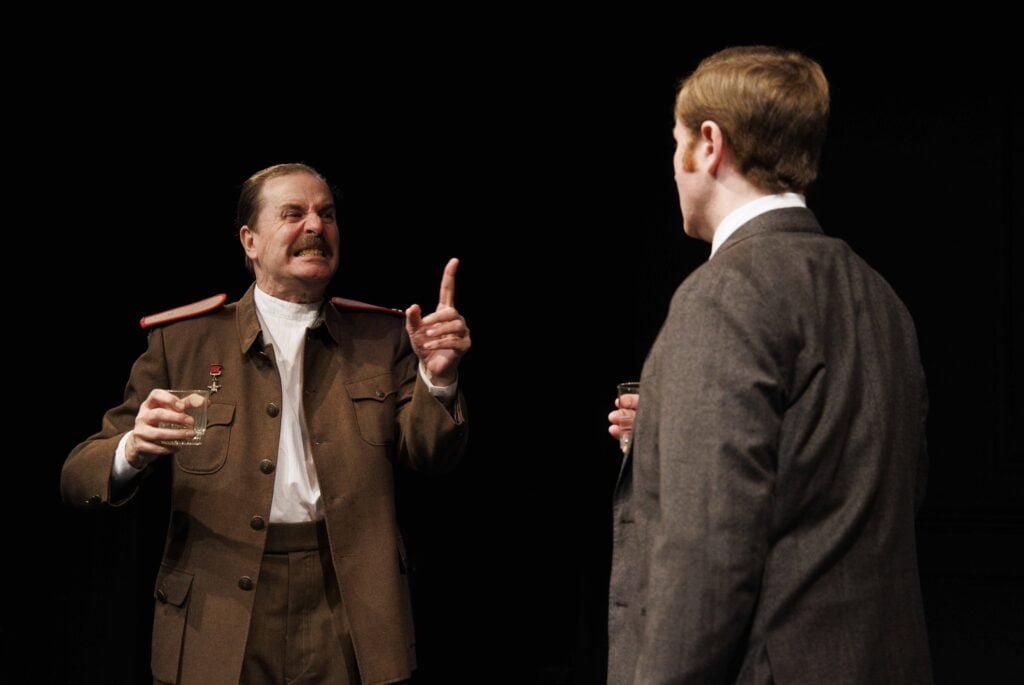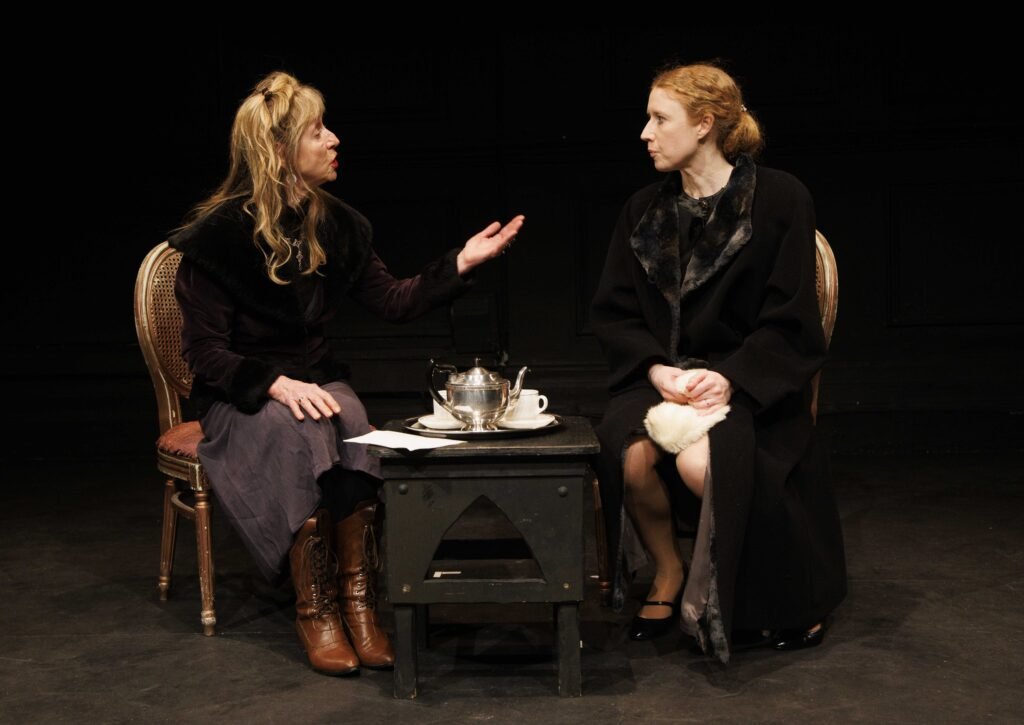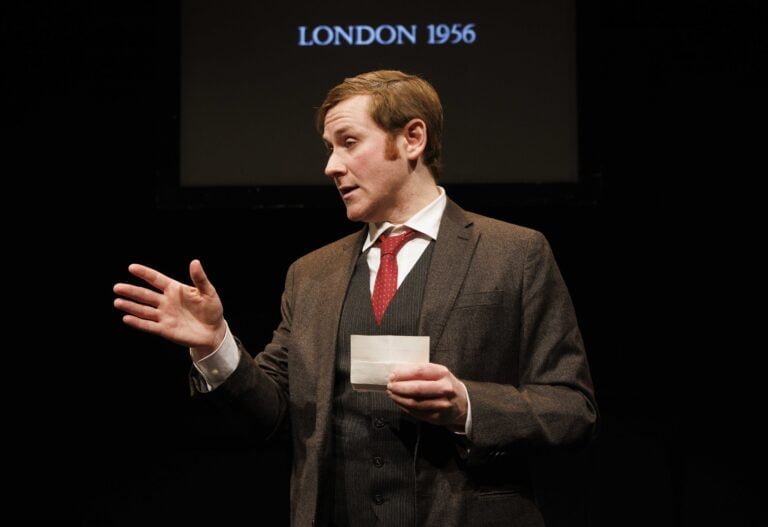The True Story of Joseph Stalin,
Harry Pollitt and Rose Cohen
“It doesn’t matter who in your party will vote, or how. What matters is who will count the votes and how.”
Stalin

I really like history plays but Francis Beckett’s Vodka with Stalin is not just an account of the relationship between the leader of the Communist Party of Great Britain and Joseph Stalin (Jonathan Hansler) but also an unrequited love story . . . but not between Pollitt and Stalin which today we might describe as a bromance with vodka! Harry Pollitt (David Malcolm) was born in Manchester in 1890 and three of his sisters died in infancy increasing his sense of injustice at the living conditions of the working class. He went on to be a founder of the CPGB.
The play opens with helpful definitions of some of the political vocabulary like Comintern, the Communist organisation that Rose Cohen (Miranda Colmans) worked for as a courier and spy. Rose was Polish and Jewish, born in London after her parents fled from Poland and her early career saw her working for the Sufragette movement and later for Beatrice and Sidney Webb.
We see Pollitt expressing to Stalin the only point that he ever disagreed with him, over the 1939 Molotov Ribbentrop non-aggression Pact between Hitler and Stalin. Pollitt had come to see Stalin not to discuss the war but to try to find out what had happened to Rose Cohen and her son.

Flashback. In 1920 Harry Pollitt is speaking on a soapbox in London and a female heckler is interrupting him. The heckler is his friend Rose Cohen and the heckling strategy is to attract listeners. We follow Rose’s career as she moves to Russia and takes money from and messages to Germany and the Ukraine. She meets her husband Max Petrovsky (Luke McArthur) and eventually becomes editor of the English language paper the Moscow Daily News.
With Stalin’s fear of Trotskyites, Rose and Max are viewed with suspicion as Jews. Rose gives birth to a son Alyosha and Max her husband is arrested. Rose goes to see her friend English woman Ivy Litvinov (Denise O’Leary), who is married to a Russian Minister after meeting him in London pre- revolution. Ivy’s advice to Rose is to leave Russia immediately but Rose has given up her British citizenship and had her passport confiscated. She is also reluctant to leave without her son.
There is good use of music in this play, jazz in London and Russian folk music in Moscow and I liked the use of the video screen to explain where we are in place and time. The problem for Harry Pollitt is whether he can influence Stalin to release Rose from imprisonment in the Purges and whether he should put the interests of his friend Rose above the future and unity of Communism. Stalin explains that the enemy is no longer the land owners, the capitalists but the socialists who prefer Trotsky’s ideas.

A photograph of Rose Cohen at the People’s History Museum in Manchester was inscribed by Harry Pollitt: “Rose Cohen – who I am in love with, and who has rejected me 14 times.”
The performances are really powerful and believable. Stalin and Pollitt exchange jokes and Stalin’s humour is political and telling, in their friendly sessions oiled with neat vodka. We learn that Stalin might not be as inebriated as expected and therefore at an advantage to his drinking companion. We suffer with Rose as she frets for her son. These children went to an orphanage and were labelled “children of enemies of the state”. I liked too Denise O’Leary’s pragmatic Ivy who knows what is likely to happen and what she could not ask her husband to do.
Francis Bennett’s 2004 book Stalin’s British Victims is a detailed account of what happened to four women caught up in Stalin’s Purge. His play A Modest Little Man about Clement Attlee was well received. He is particularly skilled at writing political plays which also bring out the humanity in his characters and allow us moments to laugh. Owain Rose too deserves credit for directing what might be a heavy narrative with a lightness of touch.
Think about the similarities between Stalin and Putin!
The fact that Rose Cohen’s story is true adds to the dramatic arc and is guaranteed not to be forgotten. The show has sold out before it opened its present run but is due to return from 29th March to 2nd April 2023.

Production Notes
Vodka with Stalin
Written by Francis Beckett
Directed by Owain Rose
Cast
Starring:
Jonathan Hansler
Denise O’Leary
Silas Hawkins
David Malcolm
Miranda Colmans
Luke McArthur
Creatives
Director: Owain Rose
Lighting Designer: Frank Turnbull
Sound Designer: Tim Solomons
Information
Running Time:Two Hours with an interval
Booking from 29th March to 9th April 2023
Theatre:
Upstairs at the Gatehouse
Highgate Village
London N6 4BD
Box Office: 020 8340 3488
Website: upstairsatthegatehouse.com
Tube: Highgate
Reviewed by Lizzie Loveridge
at Upstairs at the Gatehouse on 15th February 2023

